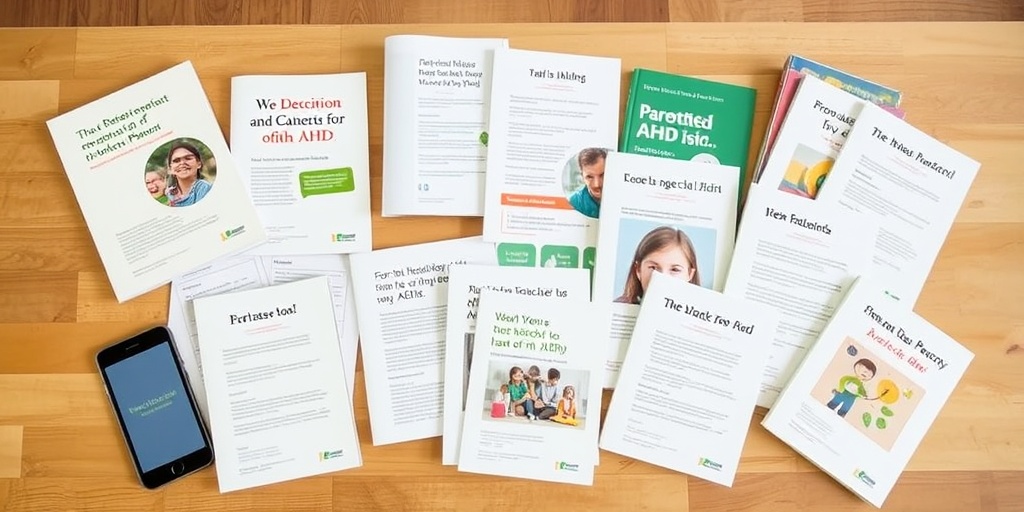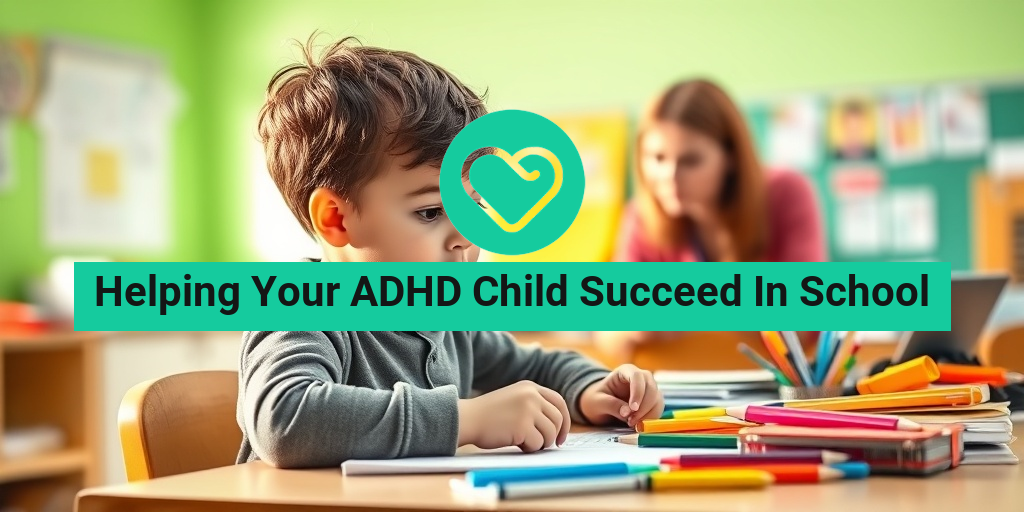Understanding ADHD
Attention Deficit Hyperactivity Disorder (ADHD) is a neurodevelopmental disorder that affects millions of children worldwide. It can significantly impact a child’s ability to focus, control impulses, and manage their energy levels. Understanding ADHD is crucial for parents, educators, and caregivers who want to help their children thrive in school and beyond.
What is ADHD?
ADHD is characterized by a persistent pattern of inattention and/or hyperactivity-impulsivity that interferes with functioning or development. The symptoms can manifest in various ways, making it essential to recognize the signs early on. While the exact cause of ADHD is still being researched, it is believed to involve genetic, environmental, and neurological factors.
Types of ADHD
ADHD is generally categorized into three types:
- Predominantly Inattentive Presentation: Children with this type may struggle to pay attention, follow instructions, and stay organized.
- Predominantly Hyperactive-Impulsive Presentation: This type is marked by excessive fidgeting, difficulty remaining seated, and impulsive decision-making.
- Combined Presentation: Children with this type exhibit symptoms of both inattention and hyperactivity-impulsivity.
The Importance of Early Diagnosis
Early diagnosis and intervention can make a significant difference in a child’s academic and social success. If you suspect your child may have ADHD, consulting with a healthcare professional is crucial. They can provide a comprehensive evaluation and recommend appropriate strategies to help your child succeed in school.
ADHD Symptoms in Children
Recognizing the symptoms of ADHD is the first step in helping your child navigate their educational journey. While every child is unique, there are common symptoms associated with ADHD that can help you identify if your child may need support.
Inattention Symptoms
Children with ADHD may exhibit the following signs of inattention:
- Difficulty Sustaining Attention: They may struggle to focus on tasks or activities, especially those that require prolonged mental effort.
- Careless Mistakes: Frequent errors in schoolwork or other activities can be a sign of inattention.
- Difficulty Organizing Tasks: Children may have trouble keeping track of assignments, materials, and deadlines.
Hyperactivity Symptoms
Hyperactivity symptoms can include:
- Excessive Movement: Children may be unable to sit still, often fidgeting or tapping their hands or feet.
- Talking Excessively: They may interrupt conversations or blurt out answers before questions are completed.
- Difficulty Engaging in Quiet Activities: Children with ADHD often find it challenging to participate in activities that require calmness and focus.
Impulsivity Symptoms
Impulsivity can manifest in various ways, such as:
- Interrupting Others: Children may struggle to wait their turn in conversations or games.
- Making Hasty Decisions: They may act without considering the consequences, leading to risky behaviors.
- Difficulty Delaying Gratification: Impulsive children often want immediate rewards and may struggle with patience.
How to Support Your ADHD Child in School
Understanding the symptoms of ADHD is just the beginning. To truly help your child succeed in school, consider implementing strategies that cater to their unique needs. Here are some effective approaches:
- Establish a Routine: Consistent daily routines can help your child feel more secure and organized.
- Communicate with Teachers: Collaborate with your child’s educators to create an Individualized Education Plan (IEP) or a 504 Plan that addresses their specific challenges.
- Use Positive Reinforcement: Celebrate your child’s achievements, no matter how small, to boost their confidence and motivation.
For more evidence-based health answers and resources, consider visiting Yesil Health AI, where you can find valuable information tailored to your child’s needs.
By understanding ADHD and recognizing its symptoms, you can take proactive steps to support your child in their educational journey. With the right strategies and support, you can help your ADHD child succeed in school and develop the skills they need for a bright future! 🌟

Impact of ADHD on Learning
Attention Deficit Hyperactivity Disorder (ADHD) can significantly affect a child’s learning experience. Understanding how ADHD impacts learning is crucial for parents and educators alike. Children with ADHD often face challenges that can hinder their academic success, but with the right strategies, they can thrive in a school environment.
Understanding ADHD and Its Symptoms
ADHD is characterized by symptoms such as inattention, hyperactivity, and impulsivity. These symptoms can manifest in various ways, including:
- Inattention: Difficulty focusing on tasks, frequent daydreaming, and trouble following instructions.
- Hyperactivity: Excessive movement, fidgeting, and an inability to stay seated.
- Impulsivity: Acting without thinking, interrupting others, and difficulty waiting for their turn.
These symptoms can lead to academic struggles, as children may find it hard to complete assignments, stay organized, or participate in class discussions. Recognizing these challenges is the first step in helping your ADHD child succeed in school.
Academic Challenges Faced by Children with ADHD
Children with ADHD often encounter specific academic challenges, including:
- Difficulty with Time Management: They may struggle to manage their time effectively, leading to missed deadlines and incomplete assignments.
- Problems with Organization: Keeping track of school supplies, homework, and schedules can be overwhelming.
- Struggles with Focus: Maintaining attention during lessons or while studying can be particularly challenging.
These challenges can lead to frustration, low self-esteem, and a negative attitude towards school. However, with the right support, children with ADHD can develop strategies to overcome these obstacles.
Creating a Supportive Environment
Creating a supportive environment at home and school is essential for helping your ADHD child succeed in school. Here are some effective strategies to consider:
Establishing Routines
Children with ADHD thrive on structure and routine. Establishing a consistent daily schedule can help them feel more secure and focused. Consider the following tips:
- Set Regular Study Times: Designate specific times for homework and studying to create a predictable routine.
- Use Visual Schedules: Visual aids can help children understand their daily tasks and responsibilities.
- Incorporate Breaks: Short breaks during study sessions can help maintain focus and prevent burnout.
Creating a Distraction-Free Study Space
A quiet, organized study space can significantly enhance your child’s ability to concentrate. Here are some ideas:
- Minimize Distractions: Choose a location away from noise and visual distractions, such as television or busy areas of the home.
- Organize Supplies: Keep school supplies organized and easily accessible to reduce frustration during homework time.
- Personalize the Space: Allow your child to decorate their study area to make it feel inviting and comfortable.
Encouraging Open Communication
Maintaining open lines of communication with your child is vital. Encourage them to express their feelings and challenges related to school. Here are some tips:
- Regular Check-Ins: Schedule time each week to discuss their school experiences and any difficulties they may be facing.
- Listen Actively: Show empathy and understanding when they share their concerns, validating their feelings.
- Collaborate on Solutions: Work together to brainstorm strategies that can help them overcome specific challenges.
By fostering a supportive environment, you can empower your ADHD child to navigate their academic journey with confidence. Remember, every child is unique, and finding the right combination of strategies may take time. With patience and persistence, you can help your child succeed in school and beyond! 🌟

Effective Study Techniques
Helping your ADHD child succeed in school often starts with implementing effective study techniques tailored to their unique learning style. Children with ADHD may struggle with focus, organization, and time management, making traditional study methods less effective. Here are some strategies that can make a significant difference:
1. Break Tasks into Manageable Chunks
One of the most effective ways to help your child is to break down larger assignments into smaller, more manageable tasks. This approach not only makes the workload feel less overwhelming but also allows your child to experience a sense of accomplishment as they complete each segment. For example:
- Instead of saying, “Write a report,” encourage them to first “Research the topic,” then “Create an outline,” and finally “Write the introduction.”
2. Use Visual Aids
Visual aids can be incredibly beneficial for children with ADHD. Incorporating charts, diagrams, and colorful notes can help your child better understand and retain information. Consider using:
- Mind maps: These can help organize thoughts and ideas visually.
- Flashcards: Great for memorization and quick reviews.
- Color-coded notes: Different colors can represent different subjects or themes, making it easier to differentiate information.
3. Establish a Routine
Creating a consistent study routine can provide structure and predictability, which is essential for children with ADHD. Set aside specific times each day for homework and studying, and stick to this schedule as closely as possible. This routine can help your child develop good habits and improve their focus over time.
4. Incorporate Movement Breaks
Children with ADHD often benefit from short breaks that allow them to move around. Incorporating brief physical activity into study sessions can help reset their focus. Try the following:
- After 20-30 minutes of studying, allow a 5-minute break for stretching or a quick walk.
- Use a timer to signal when it’s time to take a break, making it a fun and structured part of the study process.
5. Utilize Technology
There are numerous apps and tools designed to assist children with ADHD in their studies. Consider using:
- Task management apps: These can help your child keep track of assignments and deadlines.
- Note-taking apps: Digital notes can be easier to organize and edit than traditional paper notes.
By leveraging technology, you can help your child stay organized and engaged in their learning process. 📱
Collaboration with Teachers
Another crucial aspect of helping your ADHD child succeed in school is fostering collaboration with their teachers. Building a strong partnership between home and school can create a supportive environment that enhances your child’s learning experience. Here are some effective ways to collaborate with teachers:
1. Open Communication
Establishing open lines of communication with your child’s teachers is essential. Schedule regular check-ins to discuss your child’s progress, challenges, and any strategies that are working well. This can be done through:
- Email updates
- Parent-teacher conferences
- Daily or weekly communication logs
2. Share Insights About Your Child
Teachers may not always be aware of the specific challenges your child faces due to ADHD. Sharing insights about your child’s strengths, weaknesses, and effective strategies can help teachers tailor their approach. Consider discussing:
- What motivates your child
- Effective study techniques that work at home
- Any behavioral strategies that have been successful
3. Advocate for Accommodations
Many schools offer accommodations for students with ADHD, such as extended time on tests or a quiet space for studying. Work with your child’s teachers to identify which accommodations could benefit your child and advocate for their implementation. This can significantly enhance your child’s ability to succeed in school.
4. Participate in IEP or 504 Plan Meetings
If your child has an Individualized Education Program (IEP) or a 504 Plan, actively participating in these meetings is crucial. These plans are designed to provide tailored support for students with disabilities, including ADHD. Ensure that:
- You understand the goals set for your child.
- You provide input on what strategies have been effective.
- You discuss any necessary adjustments to the plan as your child progresses.
5. Encourage Teacher Support
Encourage your child’s teachers to implement supportive strategies in the classroom. This could include:
- Providing clear instructions and expectations
- Using positive reinforcement to motivate your child
- Offering flexible seating arrangements to help your child focus
By working together with teachers, you can create a cohesive support system that empowers your child to thrive academically. 🤝

Behavioral Strategies
Helping your ADHD child succeed in school requires a multifaceted approach, and implementing effective behavioral strategies is a crucial part of this process. These strategies not only support your child’s learning but also help them develop essential life skills. Here are some proven techniques to consider:
1. Establish a Routine
Children with ADHD often thrive in structured environments. Establishing a consistent daily routine can help your child know what to expect and reduce anxiety. Here’s how to create an effective routine:
- Morning Routine: Start the day with a predictable sequence of activities, such as waking up, having breakfast, and preparing for school.
- Homework Schedule: Set aside specific times for homework and study, ensuring that your child knows when to focus on schoolwork.
- Bedtime Routine: Wind down with calming activities before bed to promote better sleep, which is essential for focus and attention.
2. Use Positive Reinforcement
Positive reinforcement can be a powerful motivator for children with ADHD. Recognizing and rewarding good behavior encourages them to repeat those actions. Consider these tips:
- Verbal Praise: Acknowledge your child’s efforts and achievements, no matter how small. Simple phrases like “I’m proud of you!” can boost their confidence.
- Reward Systems: Implement a reward chart where your child can earn points or stickers for completing tasks or exhibiting positive behavior. Once they accumulate enough points, they can exchange them for a reward.
- Celebrate Success: Celebrate milestones, such as completing a project or improving grades, to reinforce their hard work.
3. Break Tasks into Manageable Steps
Large tasks can be overwhelming for children with ADHD. Breaking assignments into smaller, manageable steps can help them stay focused and reduce frustration. Here’s how:
- Chunking: Divide homework or projects into smaller sections. For example, if they have a book report, break it down into reading, outlining, writing, and editing.
- Use Timers: Set a timer for short work sessions (e.g., 15-20 minutes) followed by a short break. This technique, known as the Pomodoro Technique, can enhance focus.
- Visual Aids: Use charts or checklists to visually represent the steps needed to complete a task, helping your child stay organized.
Resources for Parents
As a parent of a child with ADHD, it’s essential to equip yourself with the right resources to support your child effectively. Here are some valuable resources that can help you navigate the challenges of ADHD:
1. Educational Websites
Numerous websites offer information, strategies, and support for parents of children with ADHD. Some reputable sources include:
- CHADD (Children and Adults with Attention-Deficit/Hyperactivity Disorder): This organization provides resources, support groups, and information on ADHD.
- ADDitude Magazine: A comprehensive resource for parents, offering articles, expert advice, and community forums.
- Understood.org: Focused on learning and attention issues, this site provides tools and resources tailored for parents.
2. Support Groups
Connecting with other parents who understand your challenges can be incredibly beneficial. Look for local or online support groups where you can share experiences, advice, and encouragement. Some options include:
- Local ADHD Support Groups: Check with schools, community centers, or mental health organizations for local meetings.
- Online Forums: Websites like Reddit and Facebook have groups dedicated to ADHD support where you can ask questions and share insights.
3. Professional Help
Sometimes, seeking professional guidance can make a significant difference. Consider consulting:
- Child Psychologists: They can provide assessments and tailored strategies for managing ADHD.
- Educational Consultants: These professionals can help you navigate the school system and advocate for your child’s needs.
- Occupational Therapists: They can assist with developing organizational skills and coping strategies.
By utilizing these behavioral strategies and resources, you can create a supportive environment that fosters your child’s success in school. Remember, every child is unique, so it may take time to find the right combination of strategies that work for your family. Stay patient and persistent! 🌟

Frequently Asked Questions
How can I help my ADHD child succeed in school?
To help your ADHD child succeed in school, consider implementing structured routines, breaking tasks into smaller steps, and providing positive reinforcement. Collaborating with teachers to create an Individualized Education Plan (IEP) can also be beneficial.
What strategies can I use to support my child with ADHD at school?
Supporting your child with ADHD at school can involve:
- Establishing a consistent homework schedule.
- Encouraging regular breaks during study sessions.
- Using visual aids and organizational tools.
- Communicating regularly with teachers about your child’s progress.
What are some effective ways to help a child with ADHD in school?
Effective ways to assist a child with ADHD in school include:
- Creating a distraction-free study environment.
- Utilizing timers to manage time effectively.
- Incorporating physical activity into their daily routine.
- Encouraging self-advocacy skills so they can express their needs.
How important is communication with teachers for my ADHD child?
Communication with teachers is crucial for your ADHD child’s success. Regular updates can help you understand their challenges and progress, allowing you to work together to implement effective strategies.
Are there specific resources available for parents of ADHD children?
Yes! Many organizations and online communities offer resources, support groups, and educational materials tailored for parents of children with ADHD. These can provide valuable insights and strategies to help your child thrive.
What role does medication play in helping children with ADHD succeed in school?
Medication can be an effective part of a comprehensive treatment plan for some children with ADHD. It’s important to consult with a healthcare professional to determine the best approach for your child, considering both the benefits and potential side effects.
How can I encourage my ADHD child to stay organized?
Encouraging organization in your ADHD child can be achieved by:
- Using color-coded folders for different subjects.
- Implementing a daily planner for assignments and tasks.
- Setting up a designated study area with minimal distractions.
What are some signs that my child may need additional support at school?
Signs that your child may need additional support include:
- Consistent difficulty completing assignments.
- Frequent forgetfulness regarding school materials.
- Struggles with following instructions or staying focused.
- Low self-esteem or frustration related to schoolwork.
How can I help my child build self-esteem while managing ADHD?
Building self-esteem in your ADHD child can involve celebrating their achievements, encouraging their interests, and providing opportunities for success in various activities. Positive reinforcement and a supportive environment are key.
What should I do if my child is struggling socially at school?
If your child is struggling socially, consider facilitating playdates, encouraging participation in group activities, and discussing social skills openly. Working with a school counselor can also provide additional support.




